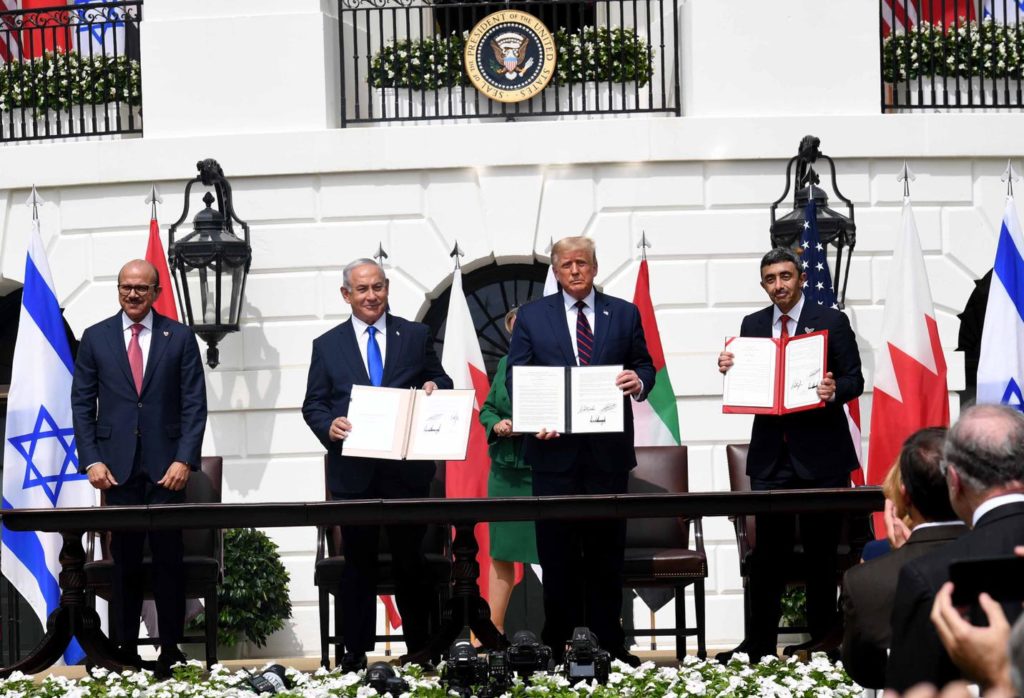Australia/Israel Review
Deconstruction Zone: A year later, the Abraham Accords are worth celebrating
Aug 26, 2021 | Gil Troy

On August 13, 2020, Israel, the United Arab Emirates and the United States announced normalisation agreements between the Jewish state and the UAE. A month later, on Sept. 15, representatives of the US, Israel, UAE and Bahrain signed the Abraham Accords at the White House. Anyone who cares about peace should be preparing massive celebrations of this breakthrough – yet the overwhelming reaction to the anniversary has been silence.
Apparently, this pesky peace agreement doesn’t fit the narrative of many activists, boycotters, Israel bashers and Palestinian rejectionists.
Some US Democrats resent the Abraham Accords because the president behind them was Donald Trump, not Joe Biden. New administrations like touting their own policies, and are reluctant to recognise any lingering glory boosting their predecessor. Given current Democratic-Republican hostilities, it is not surprising that President Biden would hesitate to celebrate one of Trump’s achievements. But here is a chance to be gracious – and to transform the Abraham Accords from Trump’s success to America’s, from partisan property to a bipartisan inheritance.
Such grace is harder for many self-styled peace activists, because the Abraham Accords prove that the road to peace is not through Palestinian extremists in Ramallah or Gaza City. For decades, activists called to appease the Palestinians, no matter how outrageous their demands and no matter how violent their tactics. The Abraham Accords bypassed Mahmoud Abbas’ oppressive Palestinian Authority and Hamas’ murderous dictatorship. Instead of giving Palestinian rejectionists veto power over the Middle East peace process, the accords suggest that true peace will come as Israel joins more and more peace agreements, and Palestinian leaders start compromising.
Boycotters, like the ice cream company Ben & Jerry’s, fear the Abraham Accords because they disprove the pretence that anti-Israel boycotts enhance peace. Boycotts only fuel the Palestinian anti-normalisation efforts by seeking to cut off contact with Israelis. The Abraham Accords flip the conversation around, showing that peace results from encouraging cultural, financial and even recreational ties. The enthusiasm of so many Israelis and Emiratis – and now Moroccans – for new relationships, expressed in song, tourism, business deals and shared start-ups, proves that boycotts are hope-killers, when what the Middle East needs right now are more bridge-builders.
The accords infuriate those who seek to blame Israel for every conflict. Israelis’ giddy bonding with Gulf Arabs showed that Zionists are not “Jewish supremacists” or racists. Israel’s warm relationship with the UAE and Bahrain, its cold peace with Egypt and Jordan and its complex arrangements with Palestinians living in different jurisdictions disprove the one-size-fits-all narratives that paint Israel as a settler-colonial oppressor or apartheid state.
Most of all, Palestinian rejectionists absolutely detest the agreement. It outs them as the biggest obstacles to peace. It showed how much Israelis yearn for acceptance – and that they are willing to stretch, to compromise. In championing “mutual understanding”, “coexistence” and “friendly relations among States,” the Abraham Accords recognised what Palestinian rejectionists, terrorists and textbook authors deny – that Jews belong in the Middle East.
On Sept. 15, Israelis, Arabs and their allies should celebrate that spirit and these accords. They should play songs like “Ahlan Bik” – “Hello You”, the YouTube hit that Israeli musician Elkana Marziano sings with the Emirati Walid Aljasim, honouring their peoples’ flourishing friendship. They should seek out forums emphasising Arabs’ and Jews’ common Abrahamic origins and shared cultural ties, bonding over hummus and falafel rather than arguing about who appropriated whose culture.
For decades, Palestinian extremists and enablers have been spreading hatred in the Middle East and beyond, seeking more and more angry allies to demonise Israel. A year ago, that circle of hate shrank considerably, as millions of Arabs joined a circle of affection and acceptance.
We all can try expanding one circle or the other.
We need a new international holiday on Sept. 15 – which this year overlaps with the eve of Yom Kippur, Judaism’s holiest day – not just to celebrate this step toward peace, but to nurture more ties, more goodwill, more Abrahamic accords and fewer Middle East wars.
Dr. Gil Troy is professor and distinguished scholar of North American History at McGill University. His latest book is Never Alone: Prison, Politics and My People, co-authored with Natan Sharansky. Reprinted from Newsweek. © Gil Troy, reprinted by permission, all rights reserved.
Tags: BDS, Bahrain, Israel, Palestinians, UAE






